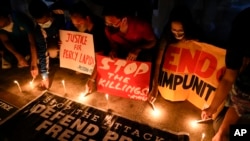Philippine authorities filed murder complaints on Monday against the top prisons official and an aide, accusing them of masterminding the killing of a radio commentator in an elaborate crime they said showed that the country's prisons system had been turned into a "criminal organization."
The complaints were filed against Bureau of Corrections chief Gerald Bantag, who has been suspended from his post, prisons security official Ricardo Zulueta and other key suspects in the October 3 fatal shooting of Percival Mabasa. The journalist had fiercely criticized Bantag and other officials for alleged corruption and other anomalies.
Mabasa, who used the broadcast name Percy Lapid, is among the latest media workers killed in a Southeast Asian country regarded as among the most dangerous for journalists in the world.
A joint statement read at a news conference by top justice, interior and police officials said three gang leaders locked up in the country's largest prison under Bantag's control were tapped to look for a gunman to kill Mabasa for a 550,000-peso ($9,300) contract.
After the killing, however, the gunman, who was identified by police as Joel Escorial, surrendered in fear after government officials raised a reward for his capture. He then publicly identified an inmate, Jun Villamor, who he said was assigned by detained gang leaders to call him and arrange Mabasa's killing.
The gang leaders later killed Villamor inside the prison by suffocating him with a plastic bag allegedly on orders of Bantag and Zulueta, officials said.
"Bantag had a clear motive to effect the murders," officials said in the statement.
Mabasa was shot to death for his critical exposes against the prisons chief, and Villamor was killed by gang leaders as a cover-up after he was publicly identified by the gunman as the inmate who arranged the killing behind bars, they said.
Bantag has denied any involvement in the killings. He and Zulueta have also been charged for the killing of Villamor. No warrants have been issued yet for their arrests, officials said.
The investigation of the killings bared "the unfortunate transformation of a pillar of justice — the correction pillar — into a deep, large-scale and systematic criminal organization," officials said in their statement.
"This will be the cause of many reforms in government and the strengthening of current mechanisms to ensure that nothing of this nature will happen again," they said.
As suspicions grew over Bantag's involvement in the two killings, President Ferdinand Marcos Jr. ordered him suspended indefinitely and replaced with a former military chief of staff, Gregorio Catapang Jr.
A recent search of the maximum-security prison complex under Bantag's control yielded more than 7,000 cans of extra-strong beer, bladed weapons, cellphones, laptop computers and suspected drugs in a discovery that deepened long-held suspicions of prison anomalies involving officials and guards, Catapang said.
"There are many crimes that we have to look into," Justice Secretary Jesus Crispin Remulla told a news conference. He cited the beer, drugs and other contrabands smuggled into prison and the deaths of 18 detained drug lords supposedly of coronavirus infection followed by their cremation in a span of 75 days.
Aside from Bantag, Mabasa had also strongly criticized former President Rodrigo Duterte, who oversaw a deadly crackdown on illegal drugs. Duterte ended his turbulent six-year term in June.
Duterte appointed Bantag as Bureau of Corrections chief in 2019 despite pending criminal complaints. Bantag had faced charges for a 2016 clash that killed 10 inmates when he was the warden in another detention center. A court later cleared him.
Media watchdogs have condemned Mabasa's killing, saying the attack underscores how deadly the Philippines remains for journalists.
Nearly 200 journalists have been killed in the country since 1986, when dictator Ferdinand Marcos was overthrown, according to the journalists' union. The group led a protest Tuesday night and called on the government to do more to stop the killings.
In 2009, members of a powerful political clan and their associates killed 58 people, including 32 media workers, in an execution-style attack in southern Maguindanao province that horrified the world.
The mass killing, linked to a political rivalry, demonstrated the dangers journalists face in the Philippines, which has many unlicensed guns, private armies controlled by powerful clans and weak law enforcement, especially in rural regions.






